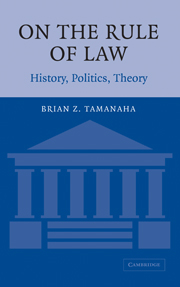Book contents
- Frontmatter
- Contents
- Acknowledgments
- Introduction
- 1 Classical origins
- 2 Medieval roots
- 3 Liberalism
- 4 Locke, Montesquieu, the Federalist Papers
- 5 Conservatives Warn
- 6 Radical left encourages decline
- 7 Formal theories
- 8 Substantive theories
- 9 Three themes
- 10 International level
- 11 A universal human good?
- Notes
- Bibliography
- Index
4 - Locke, Montesquieu, the Federalist Papers
Published online by Cambridge University Press: 05 June 2012
- Frontmatter
- Contents
- Acknowledgments
- Introduction
- 1 Classical origins
- 2 Medieval roots
- 3 Liberalism
- 4 Locke, Montesquieu, the Federalist Papers
- 5 Conservatives Warn
- 6 Radical left encourages decline
- 7 Formal theories
- 8 Substantive theories
- 9 Three themes
- 10 International level
- 11 A universal human good?
- Notes
- Bibliography
- Index
Summary
Three majestic early works, standing above all others in stature and influence, cemented the integral place of the rule of law in liberal systems: Locke's Second Treatise of Government (1690), Montesquieu's Spirit of the Laws (1748) and The Federalist Papers (1787–88) by Madison, Hamilton, and Jay. This chapter will present a summary exegesis of each contribution. They have decisively shaped the modern rule of law in Western liberal democracies. Following this exegesis will be a brief examination of the rule of law in nineteenth-century England. England deserves special mention, for it has achieved the longest-running continuous tradition of the rule of law, it was the home of Locke, it provided the prime exemplar for Montesquieu, its culture influenced the authors of the The Federalist Papers, and it was the tradition within which Dicey made his arguments about the modern decline of the rule of law (taken up in the next chapter). It is also an instructive test case, inconsistent in important respects with the framework set out in The Federalist Papers, that operates contrary to a number of popular contemporary assumptions about what the rule of law requires. To conclude this chapter a presumption contained within these accounts – the presence of a well-established legal profession – will be drawn out.
But first a mention of the seventeenth-century giant of political theory, Thomas Hobbes, who casts a shadow on liberalism as well as on the rule of law.
- Type
- Chapter
- Information
- On the Rule of LawHistory, Politics, Theory, pp. 47 - 59Publisher: Cambridge University PressPrint publication year: 2004



